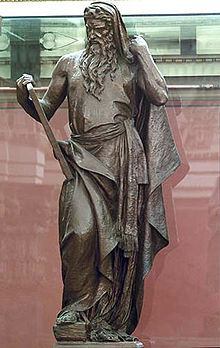
Grigory Mekheev, Exodus (2000) artist shared work under Creative Commons Attribution-Share Alike 3.0
Psalm 90
<A Prayer of Moses, the man of God.>
1 Lord, you have been our dwelling place in all generations.
2 Before the mountains were brought forth, or ever you had formed the earth and the world, from everlasting to everlasting you are God.
3 You turn us back to dust, and say, “Turn back, you mortals.”
4 For a thousand years in your sight are like yesterday when it is past, or like a watch in the night.
5 You sweep them away; they are like a dream, like grass that is renewed in the morning;
6 in the morning it flourishes and is renewed; in the evening it fades and withers.
7 For we are consumed by your anger; by your wrath we are overwhelmed.
8 You have set our iniquities before you, our secret sins in the light of your countenance.
9 For all our days pass away under your wrath; our years come to an end like a sigh.
10 The days of our life are seventy years, or perhaps eighty, if we are strong; even then their span is only toil and trouble; they are soon gone, and we fly away.
11 Who considers the power of your anger? Your wrath is as great as the fear that is due you.
12 So teach us to count our days that we may gain a wise heart.
13 Turn, O LORD! How long? Have compassion on your servants!
14 Satisfy us in the morning with your steadfast love, so that we may rejoice and be glad all our days.
15 Make us glad as many days as you have afflicted us, and as many years as we have seen evil.
16 Let your work be manifest to your servants, and your glorious power to their children.
17 Let the favor of the Lord our God be upon us, and prosper for us the work of our hands — O prosper the work of our hands!
We can only guess at the reason the editor of Psalms assembled the collections of songs and prayers in the order they did, but the ending of book three with the darkest two psalms of the collection which enter the dark night of the individual soul and the community lament over the loss of the Davidic king, the land, the temple, and Zion is suggestively answered by a psalm attributed to Moses. A community that has lost its land now learns again that God is their dwelling place. A community wondering about how they will survive in a foreign land remembers the person that God used to lead them out of the land of Egypt. In a time when God’s judgment seems like it will never end the people of Israel are taken back to when their lives were threatened by God’s anger and Moses stood between God and the people asking God to change God’s mind about the judgment God intended.
The beginning of this psalm is often used in funeral services and many people may stop at the comforting tone of verse one. Beth Tanner notes that the translation of the Hebrew by many translations as “our dwelling place” misses the emphasis of the Hebrew which translated literally is “Lord, a dwelling place YOU have been to us.” (Nancy deClaisse-Walford, 2014, p. 691) God has provided a place for the people as a place of refuge and safety, rather than the people being entitled to God being that dwelling place. The psalm rests in the space of insecurity where the people are reliant upon God’s steadfast love and compassion for their continued existence, and they do not take this for granted. They know that their lives hang in the balance between their experience of God’s wrath and the promise of God’s compassion.
This psalm attributed to Moses also mirrors the language of Exodus 32-34 where Moses stands in the space between God and the people. Moses led the people to Mount Sinai where Moses received the commandments and the instructions for the Tabernacle, but while Moses was on the mountain the people constructed the golden calf. God’s anger burns hot against the people and poses a lethal threat to the people of Israel. Moses confronts both the people of Israel and the God of Israel and boldly asks God to repent of God’s anger and spare God’s people. In Exodus 34 God’s declaration makes it clear that God is choosing to be a God who is “merciful and gracious, slow to anger, and abounding in steadfast love and faithfulness.” (Exodus 34: 6-7) God’s anger had threatened to consume the people, but now God’s presence will continue to abide among the people in their wilderness journey and in their new residence in the promised land. God chooses to continue to be a dwelling place for a people who have failed to keep God’s covenant.
The psalm oscillates between the permanence and steadfast nature of God and the frailty and transience of human life. In the Hebrew God is the eternal and mighty great birth mother[1] of the world while humans are pulverized dust.[2] The seventy or eighty years of a mortal life is comparatively a couple hours of lost sleep to God (a watch in the night). Reminding God of the fragility of human life the psalmist asks for God’s compassion upon these frail beings unable to live in the presence of God’s wrath without being consumed. The psalmist asks God for the ability to count the days of God’s anger so they will understand that there is an end.
I am writing this post near the end of August in Texas in 2023 which has been a brutally hot summer in the Dallas/Fort Worth metroplex where I live. Through July and the first twenty days of August there have been over forty days above 100 degrees, no rain, and temperatures rarely drop below 80 degrees at night. Looking at the forecast through the end of August, there is no change in sight and although I know that the temperature has to change at some point as we enter into the fall, the oppressive temperatures and the worsening drought makes every day harder. As the plants die and the soil is blown about by the hot winds it can seem like the present experience will never change. Yet, I know that September is on the horizon, and that eventually the cooler temperatures will come. It may seem trivial compared to the struggles of the people of Israel during the Exodus or during the exile in Babylon, but without a hope that things will change in the future the blast furnace of the present would be hard to endure. And just as I have no control over the weather, the people of Israel could not control how long they would be in exile. They rely upon their God’s compassion to change their situation.
For the people of Israel their problem is that God is angry with them, and that God has been angry for a long time. In the midst of God’s anger, they are like grass dying under unrelenting temperatures and persistent drought. They are waiting for the return of God’s compassion to nourish their life and God’s steadfast love to cause them to grow again. They hope, pray, and long for the end of this time of tribulation and hope to know and even longer time of gladness, joy, and growth. In their sojourn in a land that is not their own they can only rely upon God to be a place of shelter in their homelessness.
[1] The NRSV follows the Greek Septuagint reading “to mold or to form” but the Hebrew indicates that God gives birth to the earth and the world. Parallel language to Deuteronomy 32:18 “You were unmindful of the Rock that bore you; you forgot the God who gave you birth.” (Nancy deClaisse-Walford, 2014, p. 692)
[2] It is possible that there is an echo of Genesis 3:19, but a different word for dust is used here. The word in Psalms is only used here and is likely derived from the word for being crushed or pulverized. (Nancy deClaisse-Walford, 2014, p. 692)



















